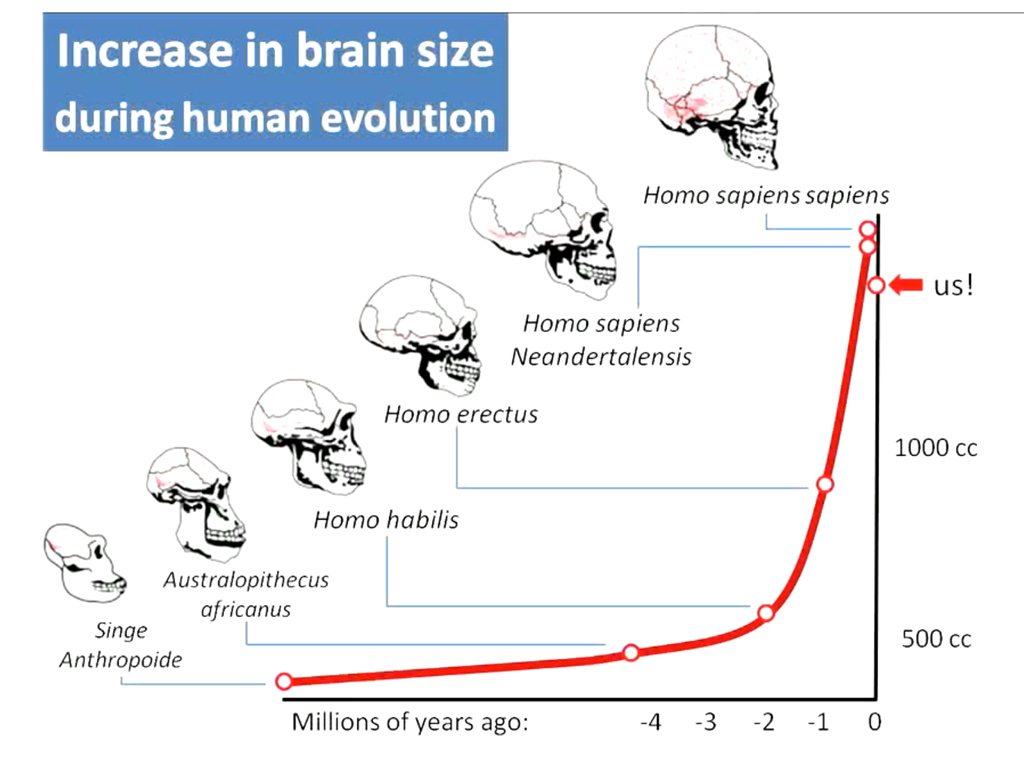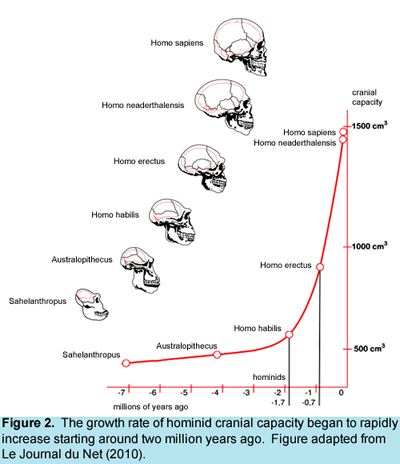- cross-posted to:
- [email protected]
- [email protected]
- cross-posted to:
- [email protected]
- [email protected]
cross-posted from: https://lemmy.ml/post/24943429
Human ancestors like Australopithecus – which lived around 3.5 million years ago in southern Africa – ate very little to no meat, according to new research published in the scientific journal Science. This conclusion comes from an analysis of nitrogen isotope isotopes in the fossilized tooth enamel of seven Australopithecus individuals. The data revealed that these early hominins primarily relied on plant-based diets, with little to no evidence of meat consumption.
They also had no science, no literature, no music, 85 % child mortality, and died of old age at 35. Coincidence?
Yeah man vegetarianism is dangerous!
Not really surprising as we had recently evolved to stand on two legs and probably lacked the brain power to hunt effectively. We only started using fire sometime during the following two million years as a we transitioned into “modern” humans. Fire was likely a huge motivator to begin consuming meat once the maillard reaction was “discovered”. The last ice age probably kicked out hunting skills into high gear due to sparse vegetation and the need to consume more fats and proteins.
Three million years ago we ate what we could find and plants do not run away or bite. What will the next great finding be, homeless people don’t eat steak?
Even many herbivores eat meat when given the chance. Plenty of videos on youtube of horses/cows eating birds for example.
Terribly reductive take. There’s a myriad of different edible plant species, variably digestible and non-digestible for different species. This article outlines how the reconstructed mouth microbiom of human ancestors as far back as 100’000 years ago was already capable of breaking down starchy foods. With the advent of fire, those would’ve been cooked just like meats and would’ve facilitated a growth in brain all the same, while being more reliable a food source.
You did not quite seem to explain how it is reductive to note the lifestyle was opportunistic based upon what was easily and safely available rather than preference, instead you just seemed to say different plants exist.
I just fail to see how eating meat is an inherent “preference” while eating plants is “opportunistic”. Seems like a false dichotomy
It is not your fault you fail to understand, people have different abilities.
Indeed. Mine include having a MSc. in Molecular Biology, yours, trolling on the internet

From your subject knowledge and comprehension you almost certainly do not have a postgraduate degree, I have a PhD in soft rock geology. I have explained to you twice that opportunistic means taking whatever is most readily available. Under the circumstances discussed that will be most often plant material but that selection does not imply any preference. You are the only one implying preference because you are trying to crowbar in your vegetarian agenda. I see also you have cranked up a few side accounts to upvote yourself.
You are the only one implying preference
Third party here, jumping into this thread. It’s pretty clear that OP didn’t say, or even imply, anything about preference, and even put scare quotes around “preference” when responding to you bringing it up. You come off as paranoid and bizarrely defensive in this thread, and it’s a bad look.
I see also you have cranked up a few side accounts to upvote yourself.
lmao got me Mr. Soft Rock 🤡
I will just leave this without further comment, people reading your “contributions” can make up their own mind as to your credibility and whether or not it is I who has the agenda.
Edit: For people actually interested in the science, here’s an interesting example of what opportunistic-carnivorous feeding would’ve looked like – underscoring the absurdity of talking about meat-eating in terms of preference in an anthropological/survival context.
It is always fun to see how offended meat-eaters get in threads like this. The beef lobby has successfully tied their product to your sense of self-worth. Congratulations, you’re very macho and manly for eating meat.
Its not a topic in this thread.

It isn’t? You’re telling me you don’t see anyone being defensive about this topic? Maybe you have them blocked or something.
Someone tell the carnists!

We know! Look at that hockey stick in the last 2 million years!
- Learning to use fire also opened up a lot more nutrients from plants including legumes and tubers that are inedible or less nutritious without cooking.
- Increased brain size is beneficial for many things other than hunting, including cooperating to outcompete rival clans and other hominids like neanderthals.
- The carnist argument in question, when applied to argue against the efficacy of plant-based diets, is essentially an appeal to nature fallacy. Learning what happened in history is interesting, but does not tell us what is beneficial to do now. If what we care about is empirical health outcomes, we should look at health outcomes data rather than trying to replicate what our ancestors did in situations that were vastly different to the ones that we find ourselves in now. And the preponderance of evidence supports equal if not better outcomes for diets that are mostly if not completely whole foods plant-based, and shows increased risk of heart disease and cancer with increased red meat and processed meat consumption.
1,2 totally agreed
when applied to argue against the efficacy of plant-based diets
I’m not making that claim
If what we care about is empirical health outcomes, we should look at health outcomes data rather than trying to replicate what our ancestors did in situations that were vastly different to the ones that we find ourselves in now.
100%
shows increased risk of heart disease and cancer with increased red meat and processed meat consumption.
https://www.dietdoctor.com/low-carb/skeptical-doctors#cancer
The science against meat is inconclusive
Personally I don’t have a opinion about what a adult should eat. Every person is navigating their own journey through health and life and needs to find what works for them. I only take issue with trying to limit people’s options on none causal observational data.
When consumed in moderation it doesn’t always make the hugest difference, but the the claim that “science against meat is inconclusive” is overselling it. Decades of studies show that reducing meat, particularly red and processed meat, in favor of plant-based proteins consistently leads to better health outcomes.
Health Outcomes: Cohort studies like Zhong et al. (2018) found that diets lower in red meat significantly reduce cardiovascular and mortality risks (DOI), while Kim et al. (2016)*linked animal protein to increased cardiovascular mortality and plant protein to lower all-cause mortality. (DOI) Similarly, the BMJ (2020) systematic review showed plant protein is associated with reduced all-cause and cardiovascular mortality. (DOI)
Cancer and Cardiovascular Disease: An umbrella review in PLOS ONE found plant-based diets are systematically linked to lower risks of heart disease and cancer. (DOI)
RCT Support: Controlled trials also confirm these findings. For example, Zeraatkar et al. (2023) found replacing animal protein with plant-based protein improves cardiovascular markers. (DOI) Twin-pair studies further showed improved metabolic health with plant-based diets. (DOI)
Nutritional Adequacy: Plant-based diets provide complete nutrition when planned well. Protein blends match whey in muscle synthesis (pubmed), while legumes and grains promote longevity (DOI, DOI).
claim that “science against meat is inconclusive” is overselling it.
https://www.dietdoctor.com/low-carb/skeptical-doctors#cancer
In brief, the data linking fat to cancer risk are inconsistent, incomplete, and unreliable.
The most consistent (albeit weak) associations between cancer risk and fat have been found over the years in observational studies looking at red meat and the risk of colorectal cancer. However, two more recent, important papers published in Annals of Internal Medicine make the case that available evidence from randomized controlled trials and observational studies does not support recommendations to lower red meat intake for prevention of cancer or heart disease.
https://www.dietdoctor.com/low-carb/red-meat#cancer
While the epidemiological studies reviewed by the committee suggest an association, other studies question the strength of the association.
large reviews and meta-analyses of observational studies, researchers have found inconsistent results. One very large meta-analysis found that the absolute effects of red meat on cancer risk are extremely low, with the certainty of evidence being low to very low.While some have shown no association of red meat and cancer risk, others have shown a positive association with gastric, esophageal, breast, and prostate cancer. Weak Protective 1 Weak Protective 2 Weak Positive 3 Weak Protective 4 Weak Protective 5
For those that did show an association, the hazard ratios were quite small, in the range of 1.06 to 1.4. In comparison, cigarette smoking has a hazard ratio greater than 20 for being associated with cancer. Therefore, although these observational studies can suggest an association between red meat and cancer, the very low hazard ratios weaken the assertion that red meat causes cancer.
I’m happy you have found a diet that works for you, I have not seen compelling non-observational evidence that ASF is dangerous, ESPECIALLY in the context of a low carbohydrate diet. I’m not trying to change your mind, but I wanted to illustrate that different reasonable people reading the literature can come to different conclusions.
Good prospective cohort studies and meta-analyses of them are some of the best evidence we can possibly get for diet, because doing lifespan-scale human RCTs is completely impractical, especially for diet. The meta analyses you shared still showed an association between reduced meat consumption and reduction of CVD risk, just with low effect size and low statistical confidence, so this is really not strongly contrary to the conclusion that red meat is better to eliminate or reduce.
I hear the “correlation is not causation” argument loud and clear, but meat is expensive, meat consumption correlates with wealth, and wealth correlates strongly with health and longevity. Diets like the Atkins diet and the Paleo diet have also been relatively popular among health-conscious people since the 70’s. The animal agriculture industry also has enormous incentive to fund studies which show animal products in a positive light. So I really don’t see any strong reason to think that confounding factors/biases would systematically favor low-meat diets rather than high-meat diets. If meat were truly neutral in terms of CVD risk, we would expect to see a near equal number of studies showing that it is protective for CVD as we see studies showing it increases CVD risk, but this is not what we see in practice.
RCTs measuring CVD biomarkers also pretty consistently show that reducing meat consumption, especially red meat, decreases well-established CVD biomarkers, so, if these results combined don’t convince you, what results would convince you?
And yes, the evidence for cancer with unprocessed red meat is weaker, but the evidence for CVD risk and CVD biomarkers is pretty consistent across both RCTs and observational studies. The small effect size you mention is consistent with the expected heterogeneous results of some studies, and the fact that the effect size is weaker than something like smoking does not mean the effect does not exist.
The CVD hazard ratio may be close to 1.11 for red meat, which means just 100g a day increases your risk for CVD by 11% (Red meat consumption, cardiovascular diseases, and diabetes: a systematic review and meta-analysis). In an animal based low carb/carnivore diet you would need to be eating 10x that much (whether or not youre incorporating other animal foods also high in saturated fat), and there’s no compelling reason to expect the results to be better by consuming more of something with demonstrable long term cardiovascular system-damaging effects, whether in the context of an extremely low carbohydrate diet or not. Studies like Dietary carbohydrate intake and mortality: a prospective cohort study and meta-analysis also show us that a moderate level of carbohydrate consumption give better results than either extreme high carbohydrate or extreme low carbohydrate diets. “There was a U-shaped relationship between carbohydrate intake and mortality in the Atherosclerosis Risk in Communities cohort, a finding that was consistent in the meta-analysis combining these data with those from the other cohorts. When assessing total carbohydrate without regard to specific food source, diets with high (>70%) or low (<40%) percentage of energy from carbohydrates were associated with increased mortality, with minimal risk observed between 50–55%. Low carbohydrate dietary patterns that replaced carbohydrate with animal-derived protein or fat were associated with greater mortality risk, whereas this association was inverse when energy from carbohydrate was replaced with plant-derived protein or fat.“
What you define as “dangerous,” is somewhat subjective, but if you care about things like minimizing all-cause mortality and heart disease risk (which you probably should, given that CVD is the number 1 killer), then it’s pretty clear that eating ASF in large amounts is suboptimal.
RCTs measuring CVD biomarkers also pretty consistently show that reducing meat consumption, especially red meat, decreases well-established CVD biomarkers, so, if these results combined don’t convince you, what results would convince you?
May I see these RCTs please? What do you consider a CVD biomarker? Not LDL hopefully. CAC scores, insulin resistance, or all cause mortality please.
then it’s pretty clear that eating ASF in large amounts is suboptimal.
I do not agree with this, a abundance of weak observational studies do not make causation. But the point of this discussion isn’t to get us to agree, just to indicate that people well versed in the literature and looking at the evidence strength would not agree that the evidence is overwhelming… which is to say there has not been a casual link established.
Does the “us” in the graph imply that carnists lost a significant amt of brain size?

Better graph. The only data I’ve seen on modern brain size differences would be due to vitamin deficiencies.




